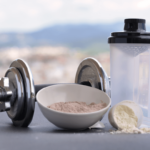When discussing overall physical health, exercise is a common topic. But nutrition is also key to good health, and high protein low-carb food choices are great for increasing muscle growth. Join us as we look at the role of nutrition in our diet, how it affects muscle growth, and some tremendous low-carb food options. Let’s get started.
Jump to:
- What Role Does Protein Play in the Diet?
- What Role Do Carbs Play in Your Diet?
- Why Are High Protein Low Carb Foods Good for Muscle Growth?
- 25 Best High Protein Low Carb Foods to Boost Muscle Gains
- 1. Chicken Breast
- 2. Eggs
- 3. Kefir
- 4. Edamame
- 5. Beef Jerky
- 6. Salmon
- 7. Cottage Cheese
- 8. Milk
- 9. Greek Yogurt
- 10. Bulgar Wheat
- 11. Roasted Chickpeas
- 12. Sunflower Seeds
- 13. Deli Turkey
- 14. Canned Tuna
- 15. Tofu
- 16. Hemp Seeds
- 17. Pumpkin Seeds
- 18. Spirulina
- 19. Black Beans
- 20. Lentils
- 21. Almonds
- 22. Pork
- 23. Halibut
- 24. Scallops
- 25. Seitan
- Pros and Cons of a High Protein Diet
- Risks of a Low-Carb Diet
- FAQs About A High Protein Low Carb Diet
What Role Does Protein Play in the Diet?
Proteins are an essential component of a healthy diet. Protein comprises smaller “chemical building blocks” called amino acids. Our body uses amino acids to build and repair muscle and bone health and to make hormones and enzymes that our body needs. We can also burn proteins as an energy source. And, when looking for foods to eat, you should focus on complete proteins.
Nutritionists call foods with all the essential amino acids complete proteins, indicating that they are ideal or high-quality protein sources. Complete proteins include animal proteins, such as chicken, grass-fed beef, fish, or collagen power, and plant-based proteins including soy and quinoa.
What Role Do Carbs Play in Your Diet?
Carbohydrates in the most common forms are sugar, starch, and fiber. Our body breaks down these nutrients into glucose which we convert to energy used to support body functions and physical activity. We can find carbs in a wide variety of foods in our diet, both healthy and unhealthy, which is why carbohydrate quality is a critical topic when discussing carbs in our diet.
High intake of low-quality carbs can lead to increased health risks and weight gain, which may be why we frequently demonize carbs. And, while the carbohydrate in its basic form is not inherently evil, some carbohydrate-rich foods are better than others. Healthy sources of carbs are raw or minimally-processed fibers such as whole grains, your favorite veggies, and fresh fruits. These foods are rich in vitamins and minerals and require our bodies to do more work to break them down into glucose. These vitamin-rich, unprocessed types of carbs are the type we need in our diet.
Unhealthy sources of carbs are the more refined or highly processed foods including white flour, pastries, cookies, and soda. Processed carbs are easily digested and could lead to weight gain, prevent weight loss, and lead to health complications such as diabetes and heart disease. You should ration or avoid these highly-refined, sugar-rich foods as much as possible to maintain a healthy diet.
Why Are High Protein Low Carb Foods Good for Muscle Growth?
Protein helps maintain and build muscle mass. Therefore, when trying to improve muscle mass, you should choose foods high in protein and low in carbs. These more complete proteins give our body all the essential amino acids needed to help build and maintain muscle mass.
Increasing the intake of high-protein foods is especially important for individuals older than 50, as doctors have seen an increase in skeletal muscle loss in this age group. Sarcopenia, or the gradual loss of bone muscle, can be worsened by chronic illness, poor diet, and inactivity. Increasing protein intake can help avoid or reverse sarcopenia and help you improve muscle mass and growth.
However, although a high protein low carbohydrate diet can help with an overall healthy diet and may help prevent or reduce muscle loss, some studies suggest that it does not affect muscle growth from exercise as much as previously claimed. When comparing weight trainers who increased their protein intake versus those who didn’t, scientists found very little difference between the muscle growth of the two groups.
25 Best High Protein Low Carb Foods to Boost Muscle Gains
When starting a high protein low carb diet, the food choice is vital to maintaining healthy nutrient levels and boosting muscle growth. Here are 25 of the best high-protein low-carb foods to help build muscle mass that you should include in your weekly rotation of dinner ideas.
1. Chicken Breast
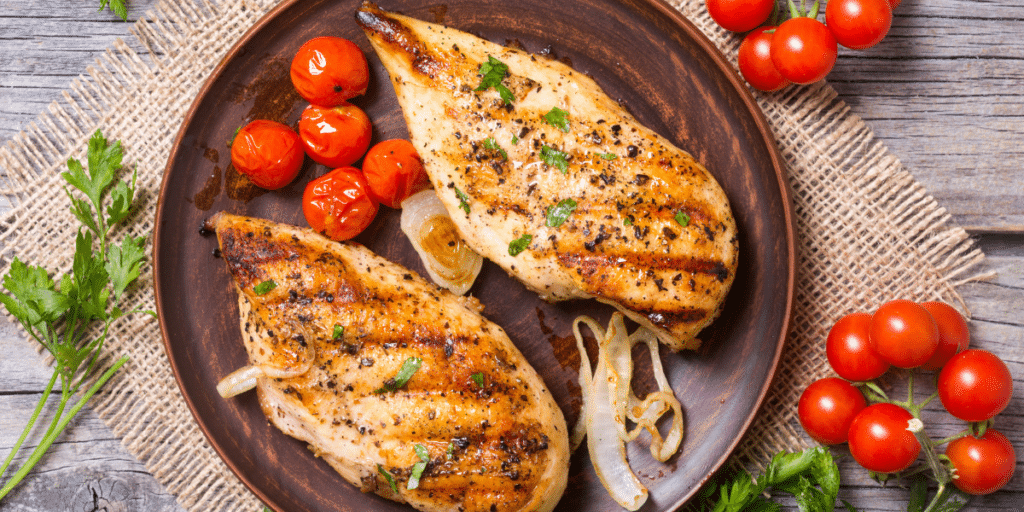
Chicken breast is one of the most commonly discussed plans, low-fat, lean proteins. Chicken has 26 grams of protein in a 3-ounce serving. With a mild flavor, most people like chicken and can easily use it in almost any recipe, such as olive oil chicken with roasted veggies. Chicken is also low in saturated fat, making it great for maintaining a healthy weight.
2. Eggs

Eggs have fantastic health benefits. With 8 grams of protein per egg, they also have less than a gram of carbohydrates, making them an excellent high protein low carb food. Eggs are also a good vitamin D source. They also have plenty of choline, an under-utilized nutrient for improving memory. Recent research has also found that eggs can help improve HDL cholesterol levels.
3. Kefir
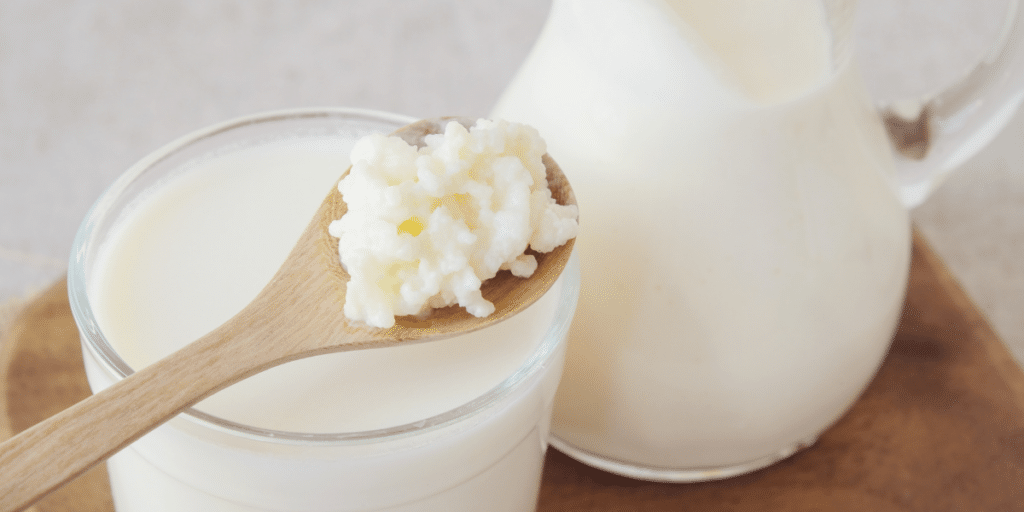
Kefir is a tangy yogurt-like drink made from fermented milk. Kefir has ten grams of protein in one cup and some good probiotics. Kefir can be made from animal or plant-based milk, but those made from animal-based milk have higher protein content. Kefir can be drunk plain or incorporated into a smoothie.
4. Edamame
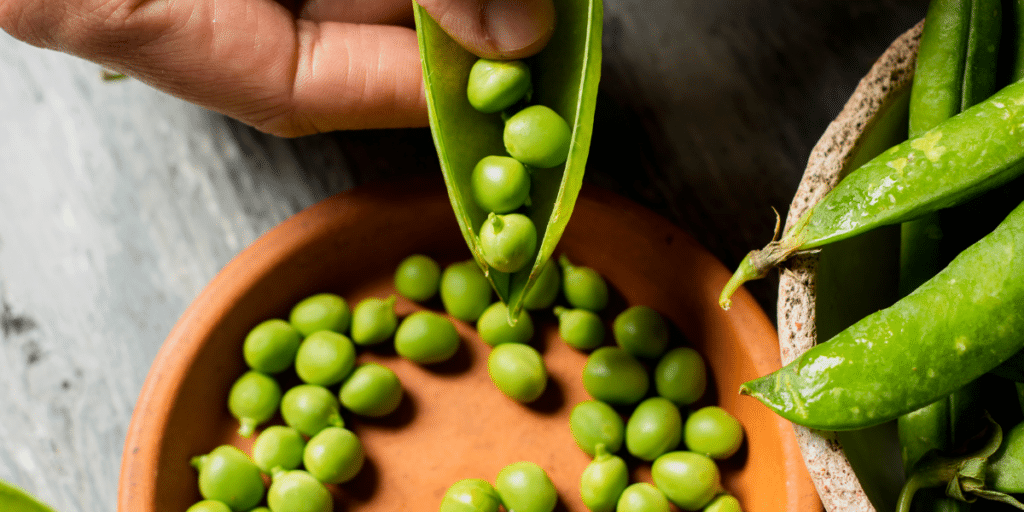
Edamame is immature soybeans with 18 grams of protein in each cup. People use edamame in many ways, such as salads, soups, or stir-fries. They are also great as a quick snack, either raw or roasted.
5. Beef Jerky
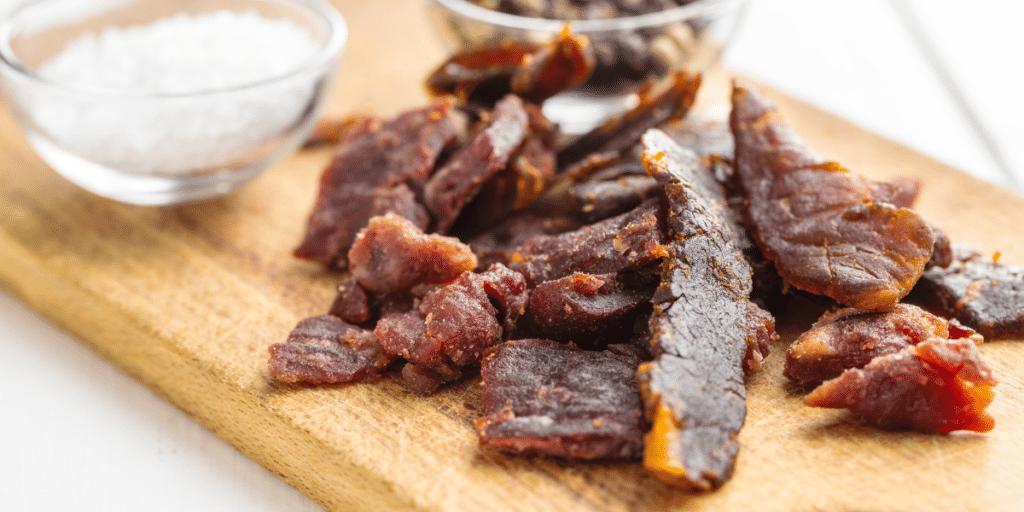
Beef jerky is a popular snack option for camping and hiking. But, to keep this food choice low carb, avoid any sweetened jerky such as teriyaki-flavored jerky because sweetened jerky often has high levels of sugar. Check the sugar content before devouring a pack of jerky.
6. Salmon
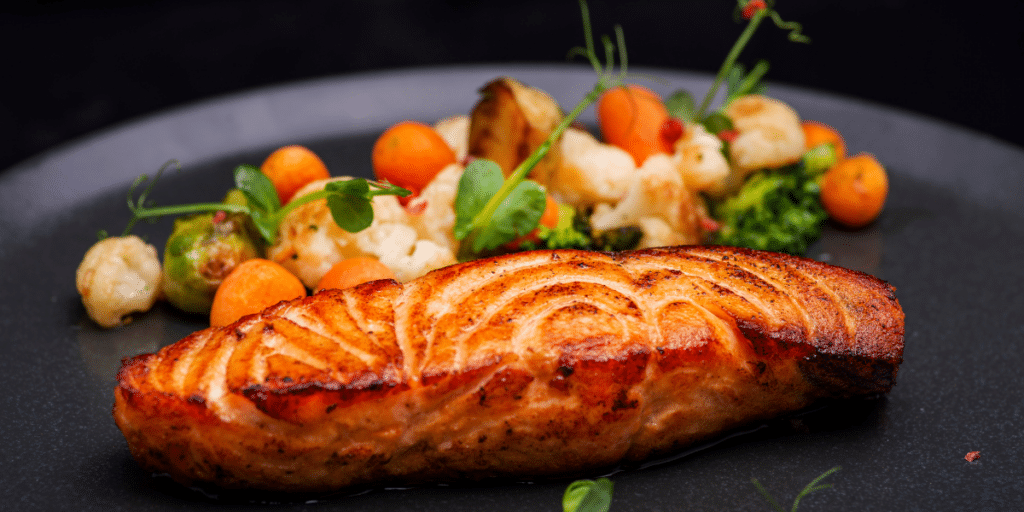
Fish is always a good choice for high protein low carb diets, and salmon is no exception. Salmon has 17 grams of protein in a 3-ounce serving and is also full of essential omega-3 fatty acids which we use to improve artery health, reduce inflammation, and enhance brain function.
7. Cottage Cheese
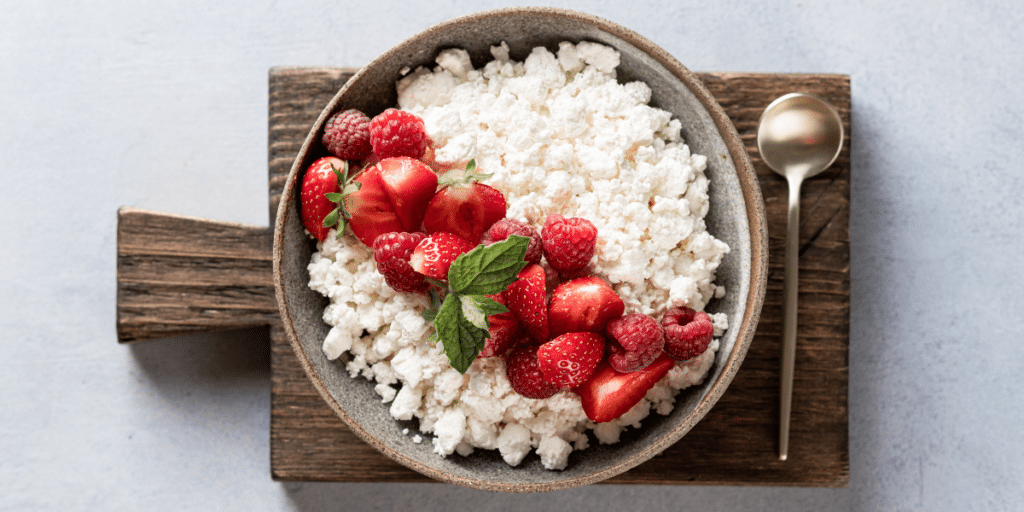
Cottage cheese is surprisingly high in protein, with 25 grams of protein in 1 cup. And it has innumerable sweet and savory meal ideas. You can include it in your breakfast or dinner recipes or eat it with some fruit as a simple snack.
8. Milk
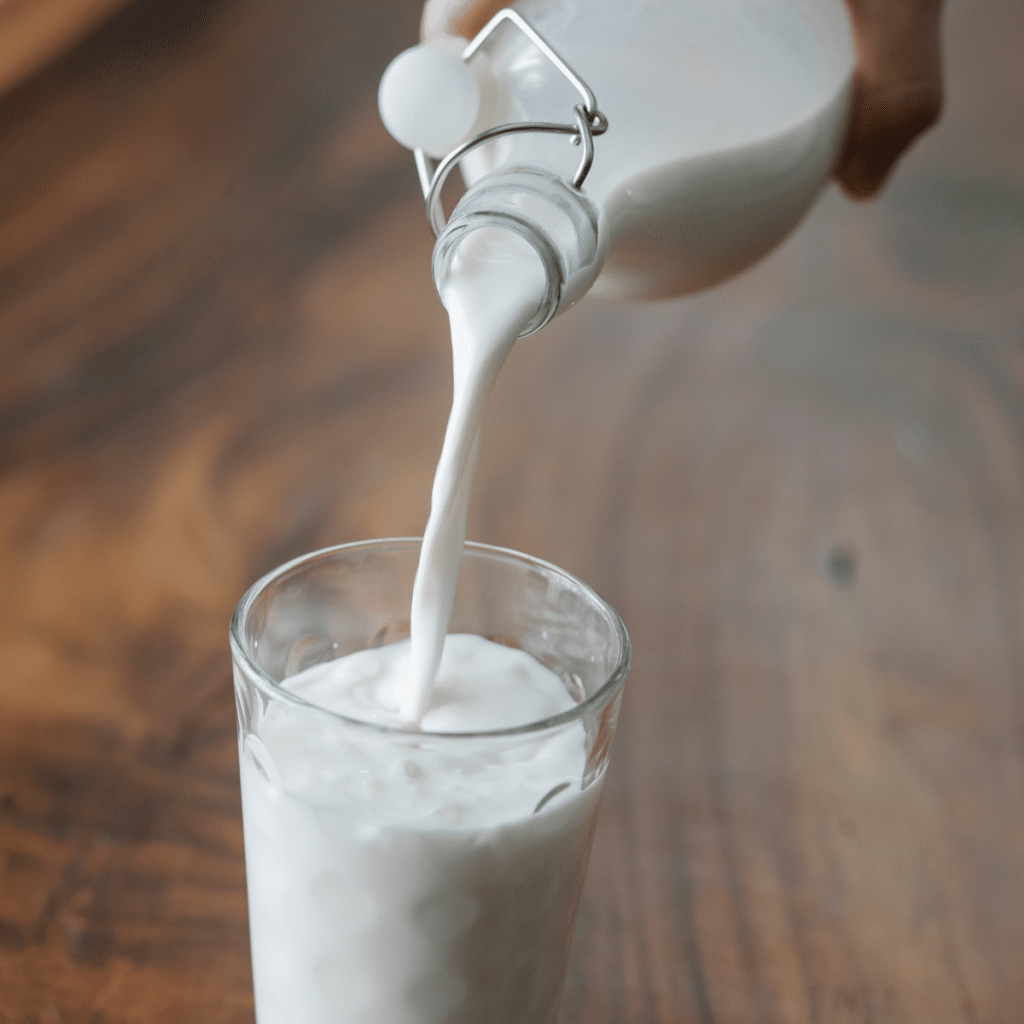
Milk is a good, relatively inexpensive way to increase the protein intake in your diet quickly. Milk has 8 grams of protein in 1 cup. It also offers healthy doses of vitamin D and calcium, both necessary for healthy bone density.
9. Greek Yogurt
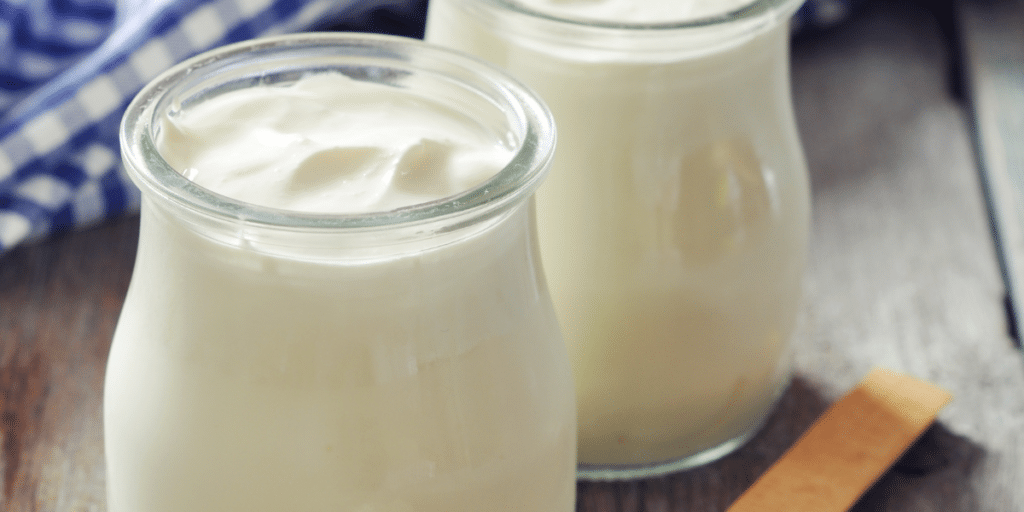
Greek yogurt is a healthy high protein food. And now, consumers have many low-sugar options. Make sure to look for Greek yogurts with less than 9 grams of sugar per serving to keep the carbs low. You can also add nuts and berries to increase the fiber content.
10. Bulgar Wheat
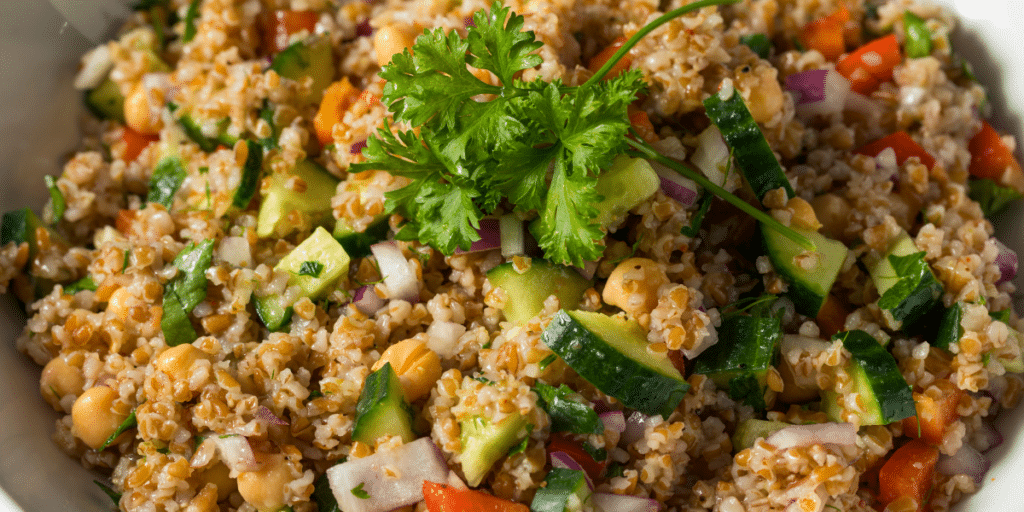
Bulgar wheat is a whole grain and provides 17 grams of protein in 1 cup, equivalent to eating three eggs. Bulgar wheat is also high in fiber, cholesterol-free, and rich in complex carbohydrates that help maintain healthy blood sugar levels.
11. Roasted Chickpeas
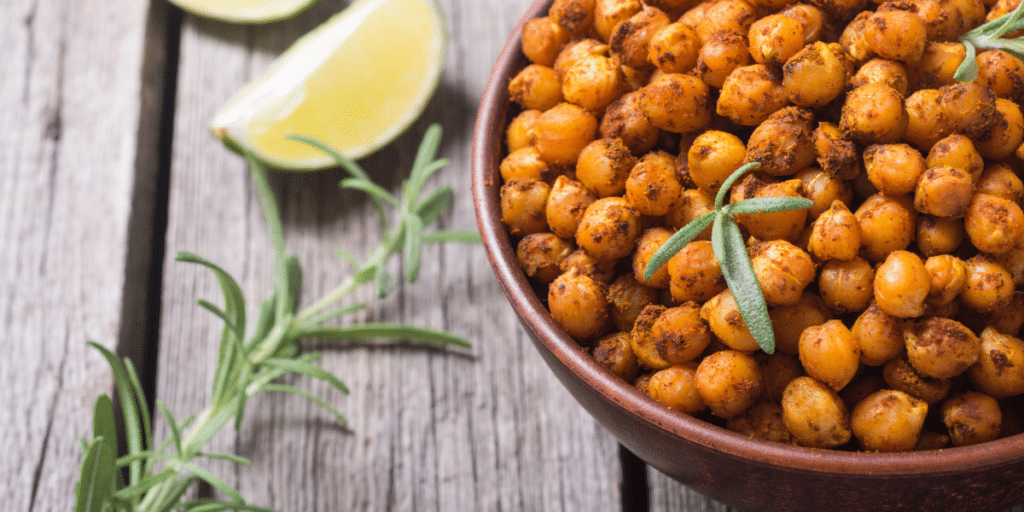
Roasted chickpeas, or garbanzo beans, are high in protein and fiber. People often use chickpeas to make hummus, but you can also roast them. Roasted chickpeas can be flavored with any spice and are a great high protein low carb snack.
12. Sunflower Seeds
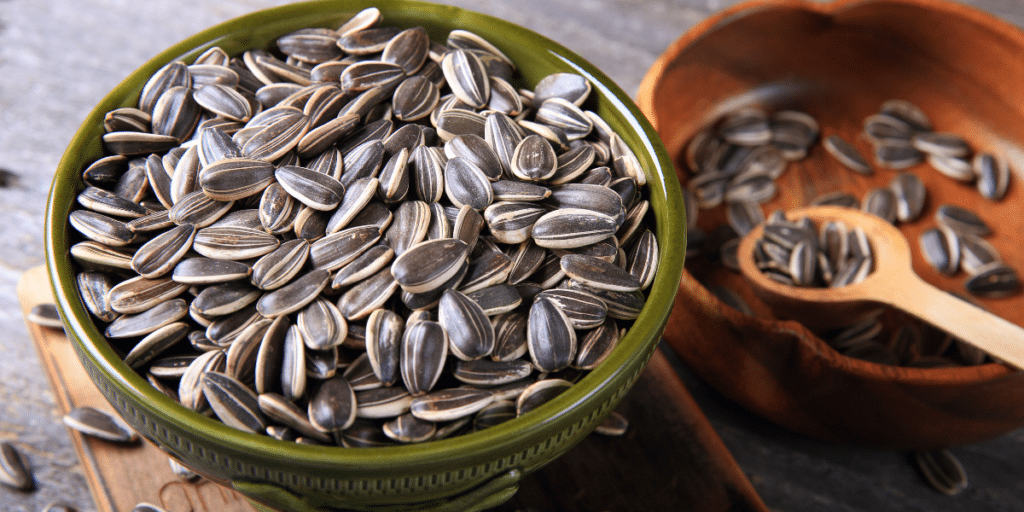
Sunflower seeds are a nutrient-rich option for a high-protein, low-carb snack. There are 24 grams of protein in 1 cup of shelled seeds. Sunflower seeds have a variety of uses so you can enjoy them as more than just a snack or in a protein bar. Try sprinkling them on your salad or in a bright basil pesto.
13. Deli Turkey
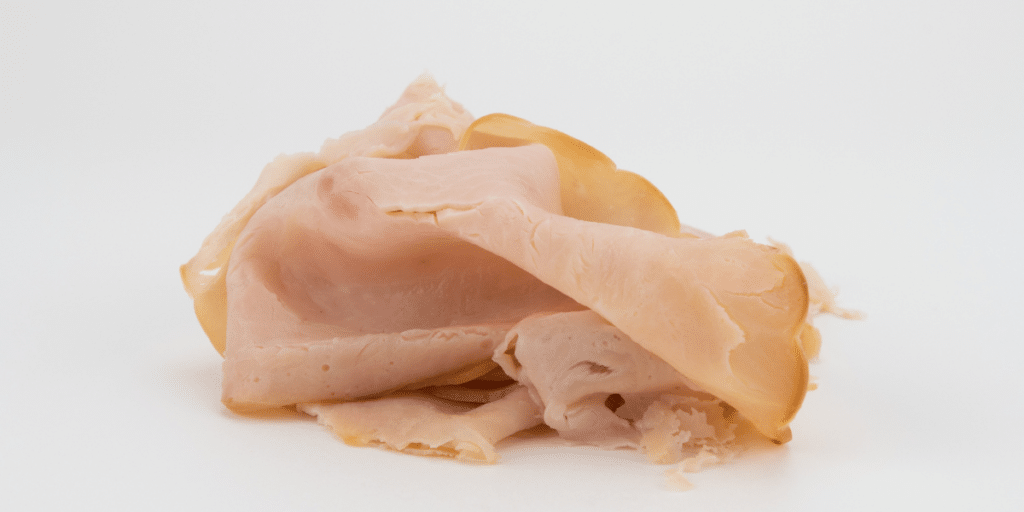
Turkey breast is a great high protein, low carb option, and deli meat makes this food a great snack food. A slice of deli meat has 12 grams of protein, making this an excellent opportunity for a simple sandwich or a breadless deli meat roll-up with your choice of healthy fillings.
14. Canned Tuna
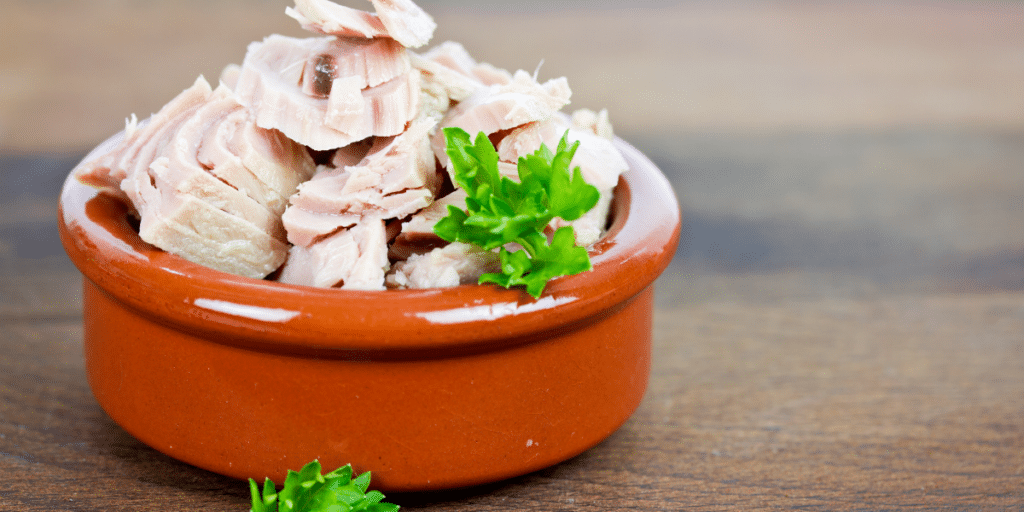
Tuna is an excellent source of protein, with 14 grams of protein in a 2-ounce serving. It’s a very versatile ingredient that can be used in various recipes. And canned tuna or tuna pouches make it so you can always have this food on hand for quick food prep. Just make sure to purchase a low-mercury brand.
15. Tofu
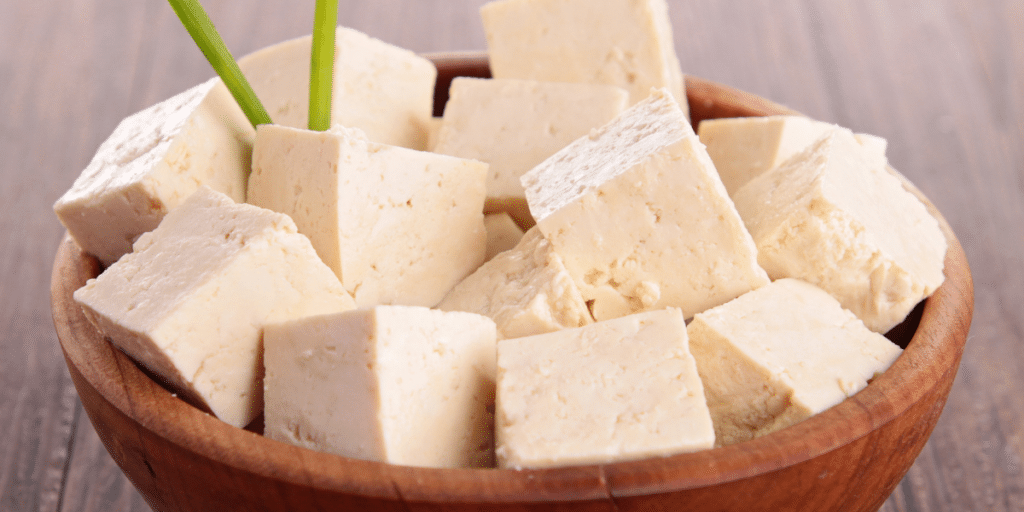
Tofu comes from soybeans and is a staple and versatile ingredient in Asian and vegetarian cuisine. It has over 40 grams of protein in 1 cup and a long shelf-life so that you can store it in your fridge for a while.
16. Hemp Seeds
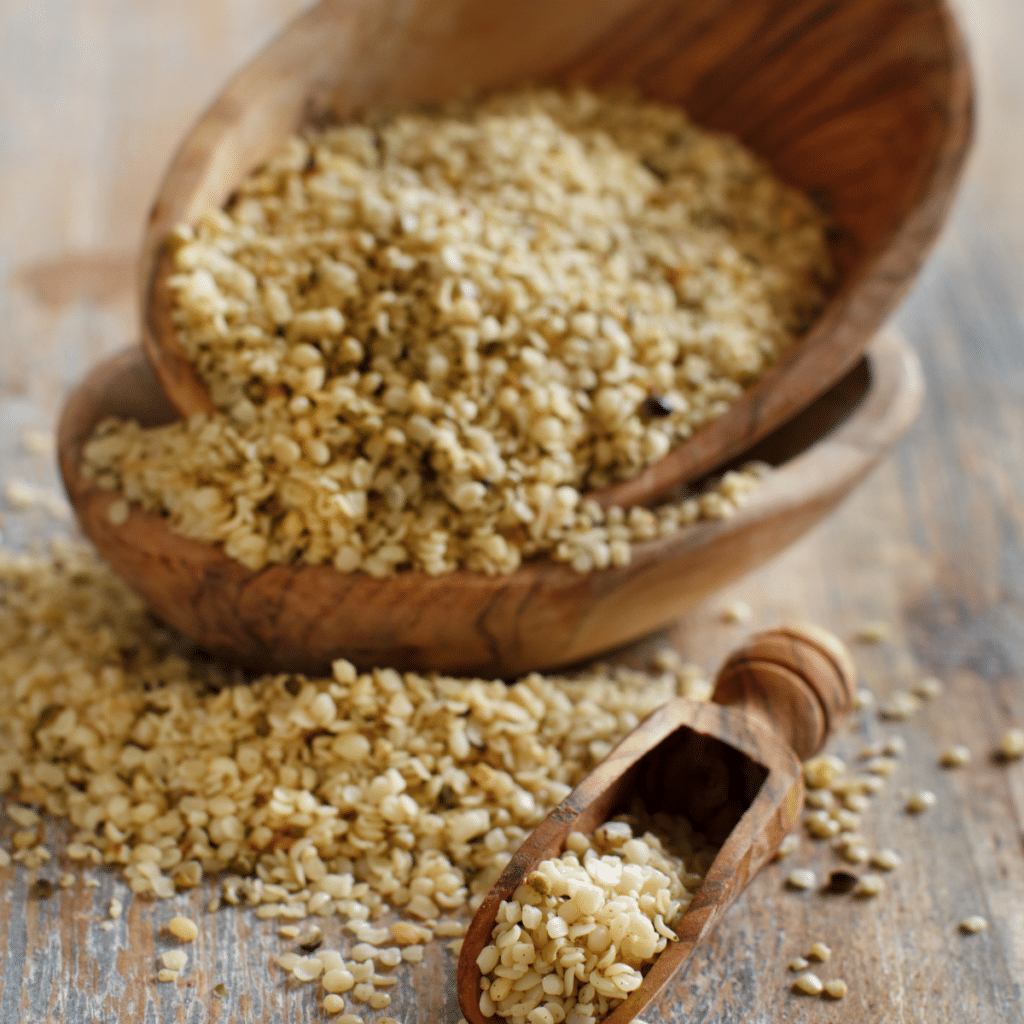
Hemp seeds are packed with protein, with protein comprising over 25% of their mass and over 40 grams of protein in 1 cup. With a nutty flavor and crunchy texture, hemp seeds are great in salads, baked goods, yogurt parfaits, and more. They are also a fantastic source of phosphorus, magnesium, iron, manganese, and heart-healthy omega-3 fatty acids.
17. Pumpkin Seeds
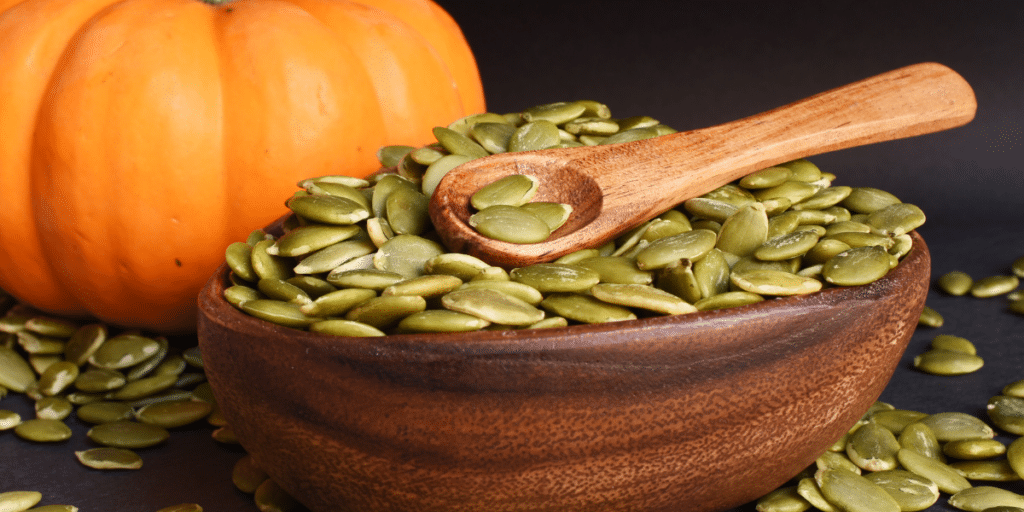
Pumpkin seeds, like other nuts, are a low-carb source of protein. One cup of pumpkin seeds has 36 grams of protein with only one net gram of carbs and three grams of fiber. Pumpkin seeds also have a fantastic dose of vitamins, minerals, and antioxidants like magnesium which our body uses for energy creation, digestion health, and stress management.
18. Spirulina
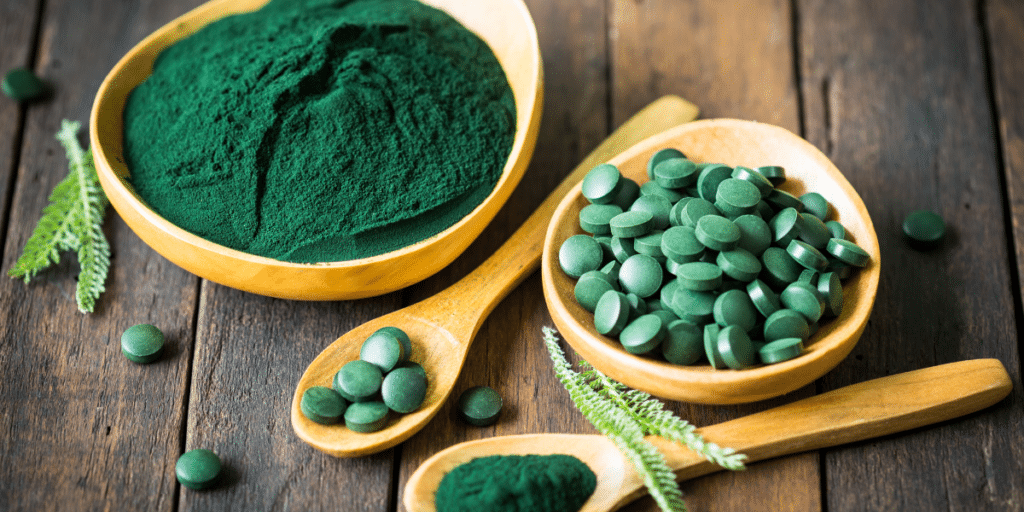
Spirulina is a blue-green algae-based dietary supplement. With almost 60% of spirulina’s weight in protein, it is a better plant-based protein than most vegetables and an excellent opportunity for a protein boost. Spirulina also has high levels of vitamins, minerals, and antioxidants. Add spirulina in a fruity breakfast smoothie or quick dip for veggies.
19. Black Beans
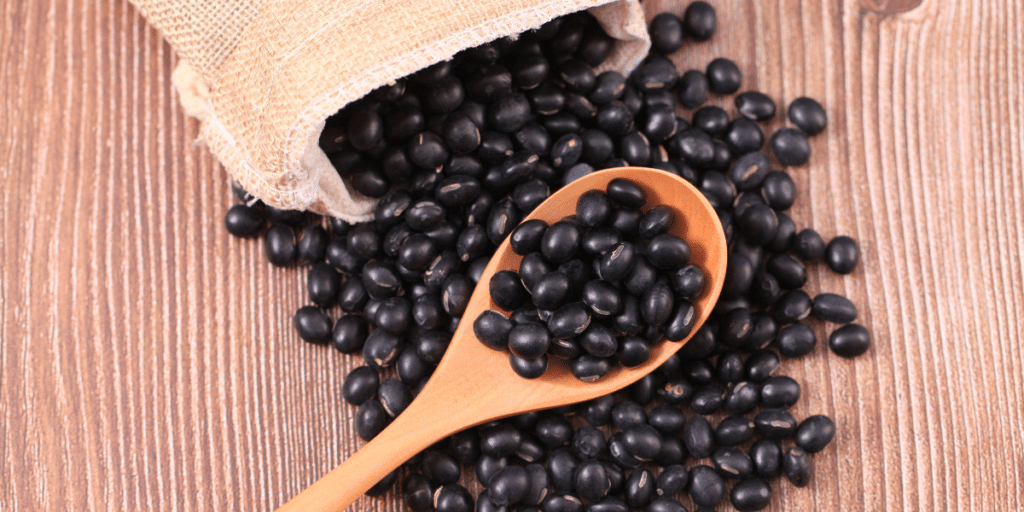
Black beans are a fantastic plant protein perfect for every vegetarian. Black beans have 15 grams of protein in 1 cup. Black beans are also an excellent source of fiber and phytonutrients, such as antioxidants.
20. Lentils
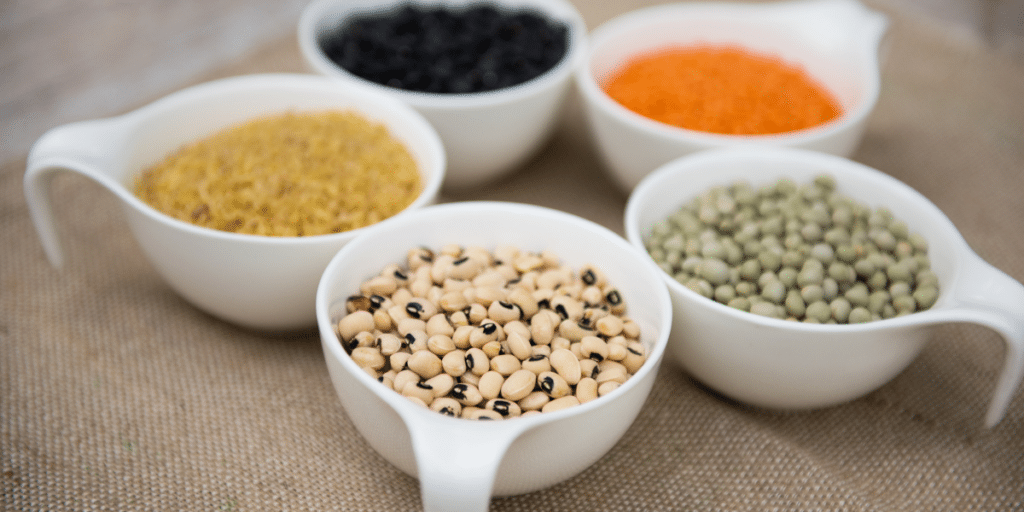
Like black beans, lentils are another tremendous plant-based food heavy in protein. Lentils have 18 grams of protein in 1 cup. They are also high-fiber, which helps to stabilize blood sugar, lower harmful LDL cholesterol levels, and improve blood pressure.
21. Almonds
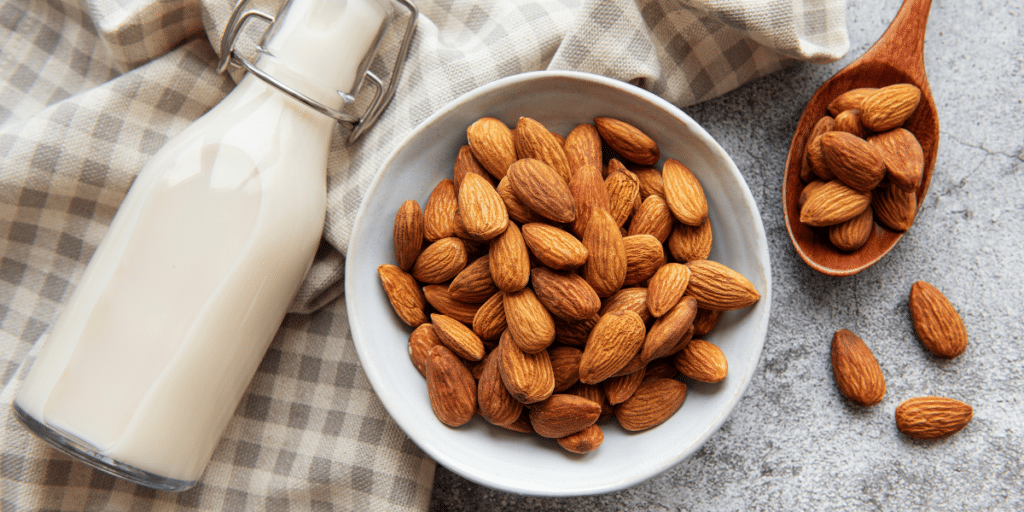
Almonds are an excellent high-protein low-carb snack. Health professionals recommend including nuts, such as almonds, in your diet to increase lifespan, reduce belly fat, and improve brain health. Almonds can be incorporated into your diet whole, or you can use almond butter, almond flour, or almond milk.
22. Pork
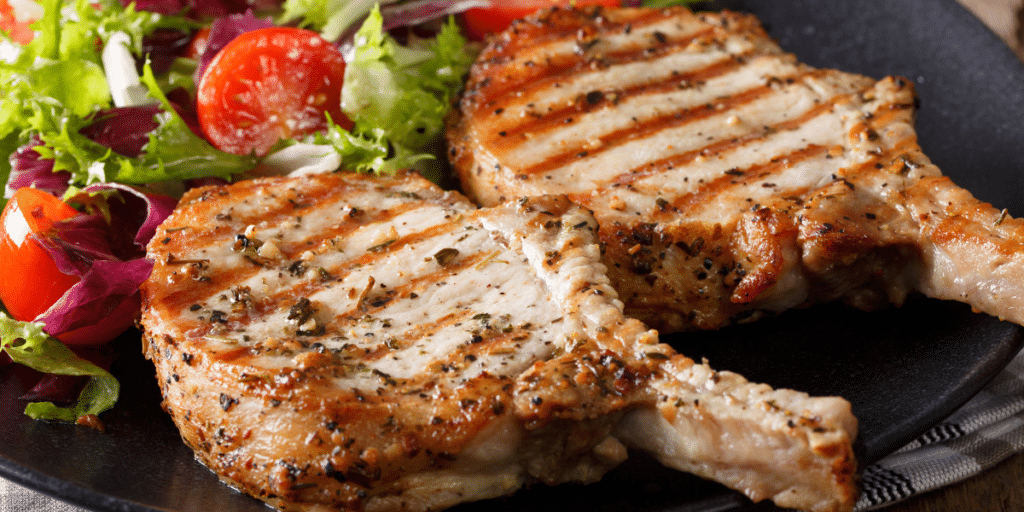
Pork is a red meat which makes it an excellent source of protein. Whether it’s a chop, ham hock, or bacon, pork has high protein levels with zero grams of carbs. However, depending on the type of pork, it can have high salt or fat levels, so be careful with portions.
23. Halibut
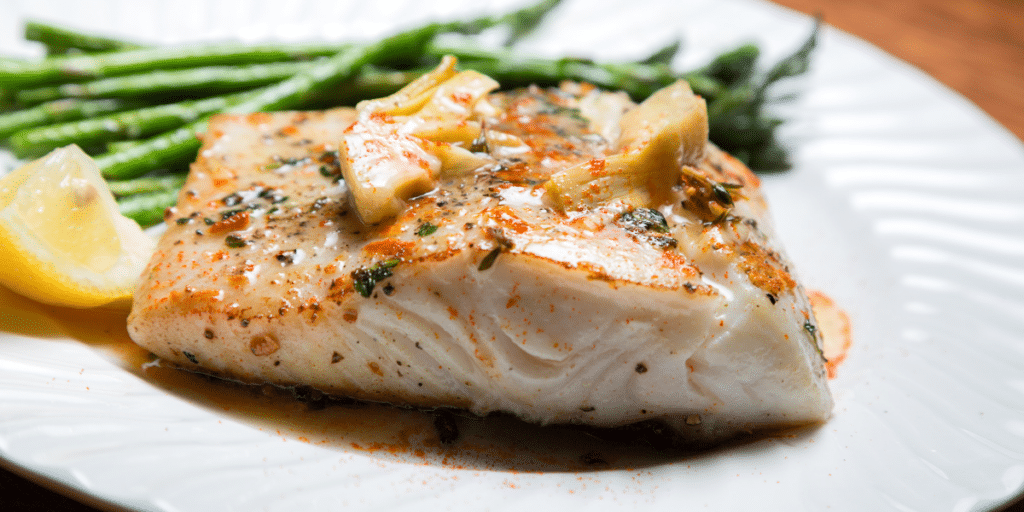
Halibut is a mild-flavored fish with 18 grams of protein in a 3-ounce serving. Halibut is also great for your heart because it contains healthy fats, like poly- and mono-unsaturated fats, and nutrients, like selenium and magnesium.
24. Scallops
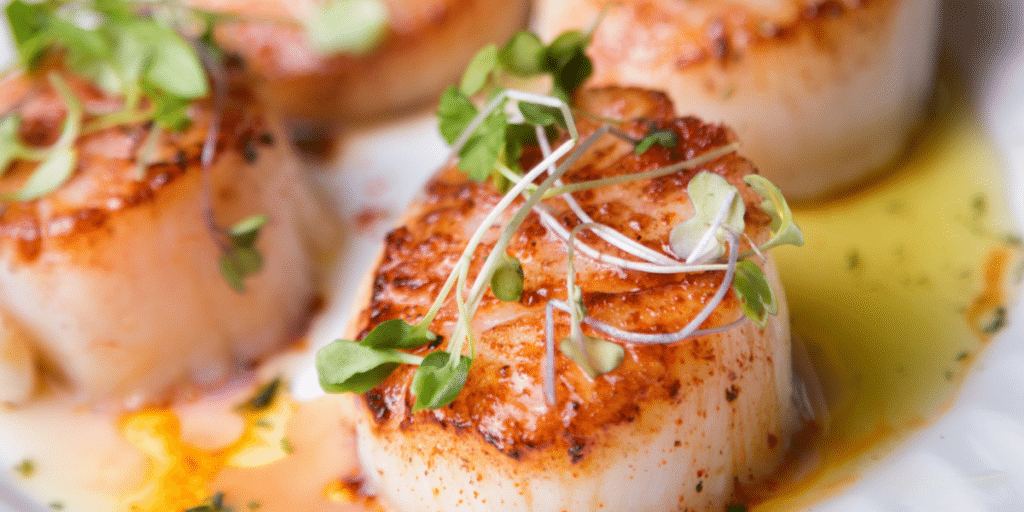
Scallops are another high-protein low-carb seafood. In a three-ounce serving, scallops have 17 grams of protein and only five net grams of carbohydrates. They are also high in potassium and magnesium, crucial minerals for good brain and heart health.
25. Seitan
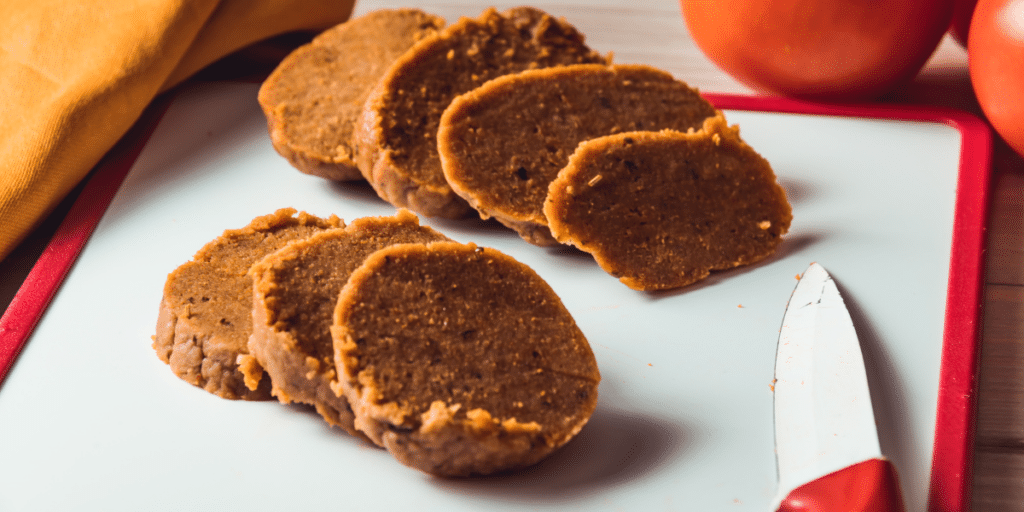
Derived from wheat, seitan is the gluten protein remaining after cleaning wheat flour. It is an excellent source of protein for vegetarian or vegan eaters as a meat substitute. However, it can be high in sodium, so be careful with how much salt you use when cooking with seitan.
Pros and Cons of a High Protein Diet
A high-protein diet has many benefits. First, a high-protein diet gives our body the amino acids needed to build and maintain muscle mass. Muscle mass is especially vital as individuals age and muscle loss becomes a genuine concern.
Additionally, a high-protein diet helps prevent protein deficiency which can lead to muscle loss, and edema, defined as swelling in the feet and ankles due to liquid retention. It prevents anemia and poor muscle growth in children or adolescents as well.
In contrast, a high-protein diet can be dangerous if taken to the extreme. High protein fad diets encourage individuals to increase their protein intake immensely, with some diets encouraging up to five times the recommended daily amount of protein. Excessively high protein diets can strain the liver and kidneys and lead to severe deficits in calcium, which could lead to osteoporosis.
Risks of a Low-Carb Diet
A low-carb diet can also be dangerous. Our body breaks down carbohydrates into glucose to support essential body functions and physical activity. So, if we restrict our carb intake so drastically that we aren’t providing enough glucose, we will begin to see a decline in energy. Our body may also enter ketosis, or start to break down muscle to get the necessary glucose, which is never ideal.
Yes, a low-carb diet can be safe if not taken to the extreme. Our body needs glucose which it gets from digesting carbs. If you restrict your carb intake so significantly that your body can’t get the glucose it needs, you will begin seeing health complications.
But by being selective about the types of carbs you consume and focusing more on high-vitamin, low-processed carbs and less on highly refined and sugary carbs, then a low-carb diet can be a safe way to manage weight and improve overall health effectively.
FAQs About A High Protein Low Carb Diet
Hopefully, you’ve learned much about a high protein low carb diet, and we’ve answered most of your questions. But if not, here are a few more frequently asked questions that may take care of some of those things you may still be wondering about.
Can I Lose Weight on a High Protein Low Carb Diet?
Yes. You can lose weight on a high protein, low carb diet. Multiple nutritional studies have shown that protein-rich diets keep individuals full longer, which makes people happier longer and reduces the urge for snacks. Other studies have shown that increasing protein while reducing carb intake also leads to weight loss.
Will a High Protein Low Carb Diet Put You in Ketosis?
A well-balanced high protein low-carb diet should not put you in ketosis. Ketosis occurs when our body breaks down muscle into glucose for the necessary energy to perform bodily functions and physical activity.
Ketosis often occurs on a low-carb diet if an individual is not balancing their carbs well because they aren’t getting enough glucose from the carbs in their diet. However, increasing protein intake while reducing carb intake has been proven to prevent ketosis.
Is a Low-Carb Diet Safe?
Yes, a low-carb diet can be safe if not taken to the extreme. Our body needs glucose which it gets from digesting carbs. If you restrict your carb intake so significantly that your body can’t get the glucose it needs, you will begin seeing health complications.
But by being selective about the types of carbs you consume and focusing more on high-vitamin, low-processed carbs and less on highly refined and sugary carbs, then a low-carb diet can be a safe way to manage weight and improve overall health effectively.








